The Intel Comet Lake Core i9-10900K, i7-10700K, i5-10600K CPU Review: Skylake We Go Again
by Dr. Ian Cutress on May 20, 2020 9:00 AM EST- Posted in
- CPUs
- Intel
- Skylake
- 14nm
- Z490
- 10th Gen Core
- Comet Lake
CPU Performance: Web and Legacy Tests
While more the focus of low-end and small form factor systems, web-based benchmarks are notoriously difficult to standardize. Modern web browsers are frequently updated, with no recourse to disable those updates, and as such there is difficulty in keeping a common platform. The fast paced nature of browser development means that version numbers (and performance) can change from week to week. Despite this, web tests are often a good measure of user experience: a lot of what most office work is today revolves around web applications, particularly email and office apps, but also interfaces and development environments. Our web tests include some of the industry standard tests, as well as a few popular but older tests.
We have also included our legacy benchmarks in this section, representing a stack of older code for popular benchmarks.
All of our benchmark results can also be found in our benchmark engine, Bench.
Speedometer 2: JavaScript Frameworks
Our newest web test is Speedometer 2, which is a accrued test over a series of javascript frameworks to do three simple things: built a list, enable each item in the list, and remove the list. All the frameworks implement the same visual cues, but obviously apply them from different coding angles.
Our test goes through the list of frameworks, and produces a final score indicative of ‘rpm’, one of the benchmarks internal metrics. We report this final score.
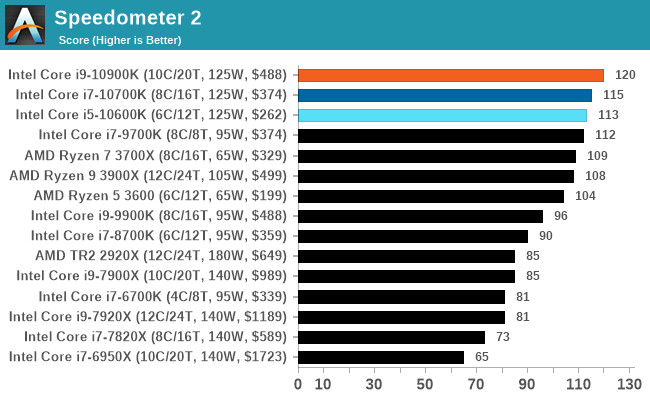
Google Octane 2.0: Core Web Compute
A popular web test for several years, but now no longer being updated, is Octane, developed by Google. Version 2.0 of the test performs the best part of two-dozen compute related tasks, such as regular expressions, cryptography, ray tracing, emulation, and Navier-Stokes physics calculations.
The test gives each sub-test a score and produces a geometric mean of the set as a final result. We run the full benchmark four times, and average the final results.
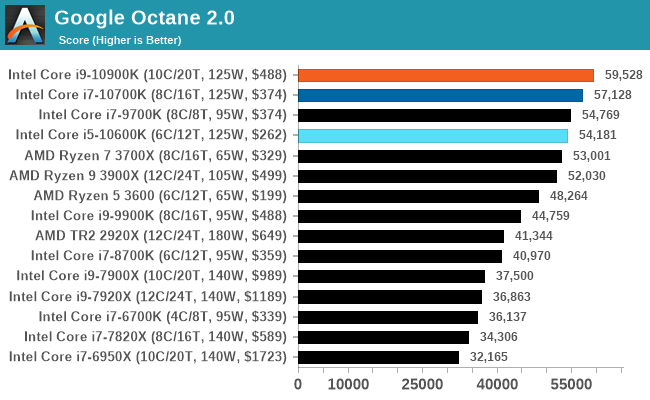
Mozilla Kraken 1.1: Core Web Compute
Even older than Octane is Kraken, this time developed by Mozilla. This is an older test that does similar computational mechanics, such as audio processing or image filtering. Kraken seems to produce a highly variable result depending on the browser version, as it is a test that is keenly optimized for.
The main benchmark runs through each of the sub-tests ten times and produces an average time to completion for each loop, given in milliseconds. We run the full benchmark four times and take an average of the time taken.
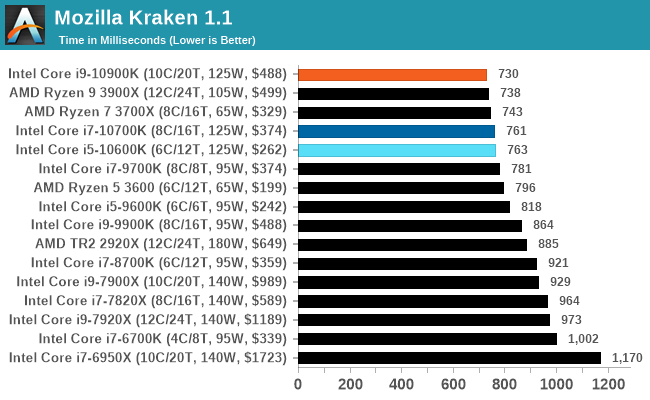
3DPM v1: Naïve Code Variant of 3DPM v2.1
The first legacy test in the suite is the first version of our 3DPM benchmark. This is the ultimate naïve version of the code, as if it was written by scientist with no knowledge of how computer hardware, compilers, or optimization works (which in fact, it was at the start). This represents a large body of scientific simulation out in the wild, where getting the answer is more important than it being fast (getting a result in 4 days is acceptable if it’s correct, rather than sending someone away for a year to learn to code and getting the result in 5 minutes).
In this version, the only real optimization was in the compiler flags (-O2, -fp:fast), compiling it in release mode, and enabling OpenMP in the main compute loops. The loops were not configured for function size, and one of the key slowdowns is false sharing in the cache. It also has long dependency chains based on the random number generation, which leads to relatively poor performance on specific compute microarchitectures.
3DPM v1 can be downloaded with our 3DPM v2 code here: 3DPMv2.1.rar (13.0 MB)
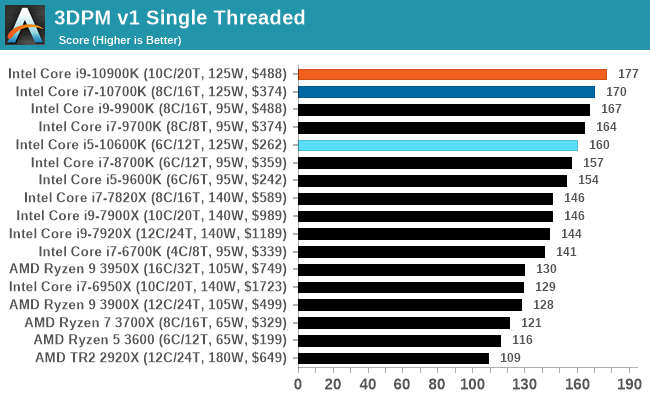
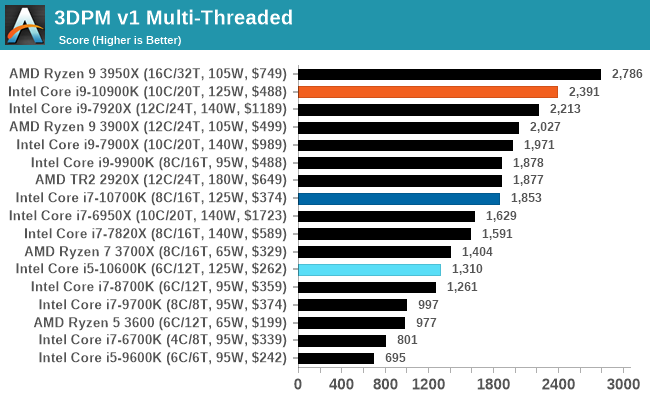
x264 HD 3.0: Older Transcode Test
This transcoding test is super old, and was used by Anand back in the day of Pentium 4 and Athlon II processors. Here a standardized 720p video is transcoded with a two-pass conversion, with the benchmark showing the frames-per-second of each pass. This benchmark is single-threaded, and between some micro-architectures we seem to actually hit an instructions-per-clock wall.
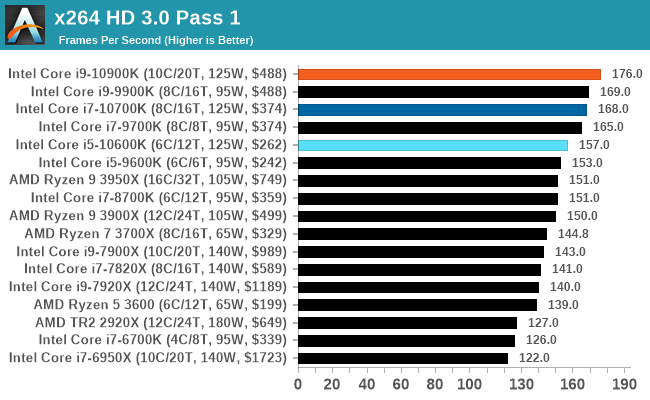
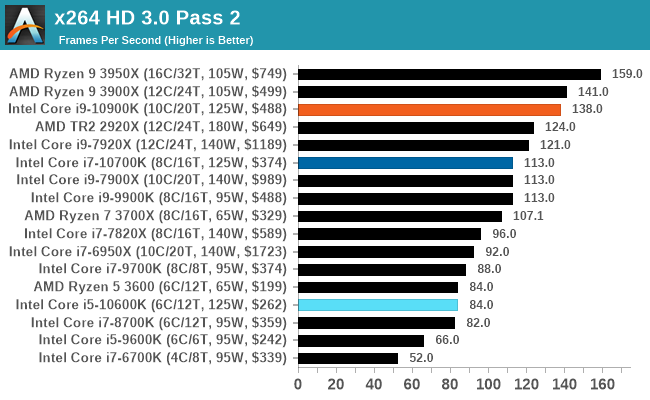










220 Comments
View All Comments
Darkworld - Wednesday, May 20, 2020 - link
10500k?Chaitanya - Wednesday, May 20, 2020 - link
Pointless given R5 3000 family of CPUs.yeeeeman - Wednesday, May 20, 2020 - link
Yeah right. Except it will beat basically all and lineup in games. Otherwise it is pointless.yeeeeman - Wednesday, May 20, 2020 - link
All AMD lineup*SKiT_R31 - Wednesday, May 20, 2020 - link
Yeah with a 2080 Ti the flagship 10 series CPU beats AMD in most titles, generally by a single digit margin. Who is pairing a mid-low end CPU with such a GPU? Also if there were to be a 10500K, you probably don't need to look much further than the 9600K in the charts above.This may have been missed on you, but what CPU reviews like the above show is: unless you are running the most top end flagship GPU and are low resolution high fps gaming, AMD is better at every single price point. Just accept it, and move on.
Drkrieger01 - Wednesday, May 20, 2020 - link
It also means that if you have purchased an Intel 6th gen CPU in i5 or i7, there's not much reason to upgrade unless you need more threads. And it will only be faster if you're using those said threads effectively. I'm still running an i5 6600K, granted it's running at 4.6GHz - there's no reason for me to upgrade until either Intel and/or AMD come up with better architecture and frequency combination (IPC + clock speed).I'll likely be taking the jump back to AMD for the Ryzen 4000's after a long run since the Sandy Bridge era.
Anyone needing only 4-6 cores should wait until then as well.
Samus - Thursday, May 21, 2020 - link
That's most people, including me. I'm still riding my Haswell 4C/8T because for my applications the only thing more cores will get me is faster unraring of my porn.Lord of the Bored - Thursday, May 21, 2020 - link
Hey, that's an important task!Hxx - Wednesday, May 20, 2020 - link
at 1440p intel still leads in gaming. It may not lead by much or may not lead by enough to warranty buying it over Intel but the person buying this chip is rocking a high end gpu and will likely upgrade to a high end gpu and the performance gap will only widen in intel's favor as the gpu becomes less of a bottleneck. So yeah pairing this with a 2060 makes no sense, go AMD. but pairing this with a 2080ti and a soon to be released 3080TI oh yeah this lineup will be a better choice.DrKlahn - Thursday, May 21, 2020 - link
By that logic the new games released since the Ryzen 3x000 series debut last year should show a larger gap at 1440+ between Intel and AMD. But they don't. And judging by past trends I doubt they will in the future either.As GPUs advance so does the eye candy in the newer engines, keeping the bottleneck pretty much where it always is at higher resolutions and detail levels, the GPU.